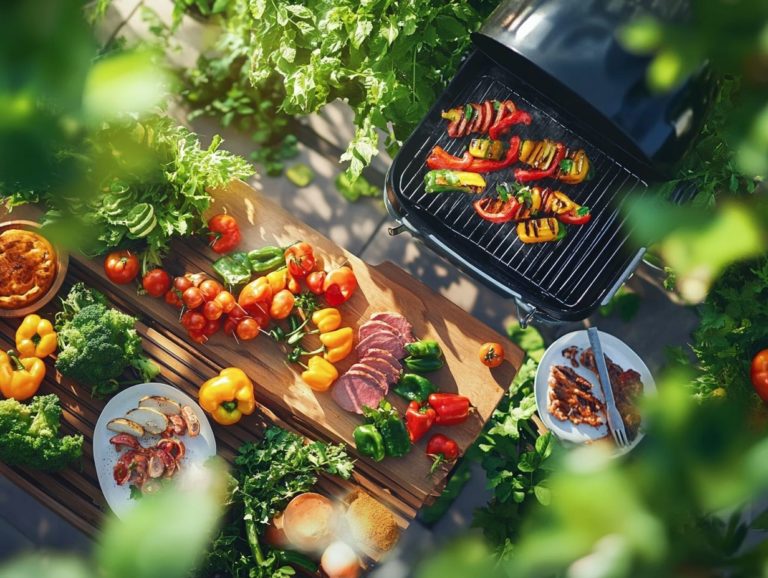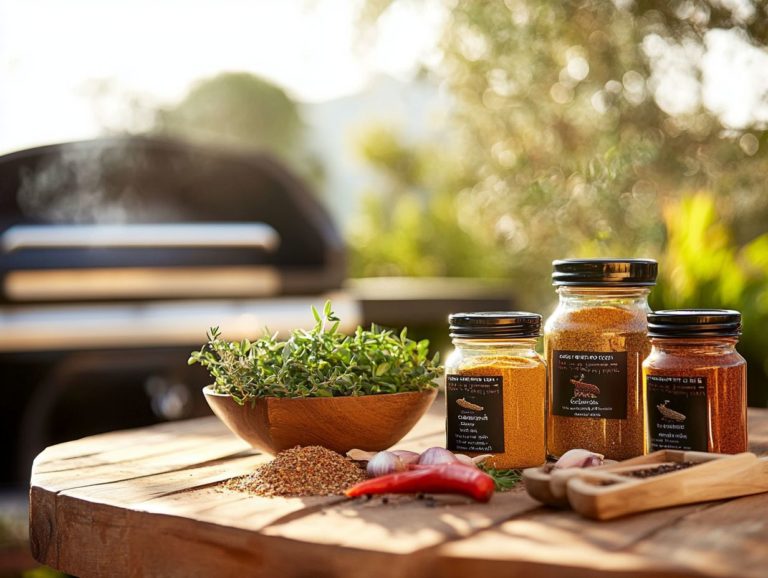What Are the Most Eco-Friendly Ways to Cook Outdoors?
Cooking outdoors is a delightful way to embrace nature and adopt eco-friendly solutions. Get ready to elevate your outdoor cooking adventures sustainably, one delicious meal at a time!
This article explores various sustainable cooking methods, including solar, wood-fired, and compost cooking. It offers tips for sourcing sustainable ingredients and strategies for waste reduction to ensure that outdoor cooking remains environmentally friendly.
Contents
- Key Takeaways:
- Benefits of Cooking Outdoors
- The Eco-Friendly Factor
- Eco-Friendly Cooking Methods
- Frequently Asked Questions
- What are the most eco-friendly ways to cook outdoors?
- How does using a solar oven compare to a gas or charcoal grill?
- What are the benefits of using an electric grill?
- Is cooking with a wood-fired stove sustainable?
- How can I minimize waste when cooking outdoors?
- Are there any other eco-friendly tips for cooking outdoors?
Key Takeaways:
- Solar cooking is a sustainable and cost-effective way to cook outdoors, using only the power of the sun.
- Wood-fired cooking not only adds unique flavor to food but also minimizes environmental impact by using a renewable fuel source.
- Sourcing locally grown and organic ingredients for outdoor cooking lowers transportation emissions and supports sustainable agriculture.
Benefits of Cooking Outdoors
Cooking outdoors provides numerous benefits, including the promotion of sustainable practices. For instance, using a high-quality grill helps prevent air pollution and lowers carbon emissions.
Outdoor cooking can cut water waste by 80% compared to traditional methods. Grilling also allows for the use of cleaner fossil fuels, such as natural gas or propane.
The Eco-Friendly Factor
The eco-friendliness of outdoor cooking is becoming increasingly important as more people embrace greener grilling methods that promote sustainability.
Using natural gas or propane instead of traditional charcoal reduces air pollution during the cooking process, resulting in a cleaner cooking environment. Adopting sustainable cooking practices enhances the flavor of food and contributes to global efforts to reduce resource consumption.
Why Choose Eco-Friendly Cooking Methods?
Eco-friendly cooking methods do more than just benefit your health; they help protect the environment too! Methods such as using an electric charcoal starter or natural lighter fluids generate fewer harmful emissions, contributing to cleaner air quality.
These eco-friendly approaches also reduce preheat time when grilling outdoors, resulting in a more enjoyable cooking experience. They do not compromise the advantages of outdoor cooking, such as savoring flavorful meals while protecting you from toxic fumes.
Using energy-efficient appliances can also lower your utility bills, highlighting that eco-friendly cooking methods provide both health benefits and sound economic choices.
By choosing eco-friendly cooking methods, you join a growing community committed to sustainability, fostering a sense of responsibility about preserving our planet for future generations.
Eco-Friendly Cooking Methods
Eco-friendly cooking methods are designed to minimize negative environmental impacts while enhancing the flavor of your food. Techniques like solar cooking, wood-fired grilling, and the use of electric or propane options represent some of the greener grilling methods available.
These approaches not only promote sustainable outdoor cooking but also contribute to reducing carbon emissions, making grilling more environmentally friendly.
Solar Cooking
Solar cooking offers an exciting way to prepare food while helping the planet! It utilizes the sun’s energy to cook without traditional fuel sources. This method reduces waste and lowers the carbon dioxide emissions associated with cooking, as it eliminates the need for burning fuel. Solar cooking conserves energy and is recognized as a form of green grilling and outdoor sustainability.
Solar cooking employs solar cookers, which come in various types, including box cookers, parabolic (dish) cookers, panel cookers, and hybrid cookers. Each style has its own advantages and disadvantages. Box cookers, for example, feature well-insulated chambers that retain heat, making them ideal for slow cooking.
In contrast, parabolic cookers concentrate the sun’s rays onto a small cooking area, achieving much higher temperatures, making them the best choice for boiling or frying. However, box cookers are limited to steaming, baking, or slow cooking.
The efficiency of solar cooking depends on how much sun you get and where you live. Using solar cookers aligns with the broader movement toward sustainable outdoor cooking by reducing dependence on fossil fuels and contributing to a healthier planet.
Wood-Fired Cooking
Wood-fired cooking is a traditional technique that utilizes grilling and other methods, such as wood-fired ovens or braziers, to prepare food outdoors. This approach adds a deliciously smoky flavor and is also environmentally friendly. Natural wood generates a significantly lower carbon footprint compared to fossil fuel options, making it a sustainable grilling method.
The primary component of this technique is the wood itself, with different types contributing distinct flavors. Woods like hickory, mesquite, applewood, cherry, and pecan offer various flavor profiles that enhance the taste of a wide range of foods, from meats to vegetables.
Pros and Cons of Wood-Fired Cooking:
Benefits:
- Improves the flavor and taste of food, particularly meats and vegetables.
- Strengthens the connection to nature during the cooking and preparation process.
- Creates beautiful atmospheres and experiences for outdoor cooking, especially for those who value sustainable practices.
Drawbacks:
- Consistent heat can be difficult to maintain.
- Achieving high cooking temperatures can be challenging.
- Managing and controlling smoke can present difficulties.
Compost Cooking and Sustainable Practices
Compost cooking is a culinary style that uses organic waste to enhance soil health and promote eco-friendly cooking practices. This approach reduces the amount of waste sent to landfills and encourages the use of sustainable ingredients in outdoor cooking. By incorporating composting into gardening practices, individuals can harness natural cycles to further their culinary and environmental goals.
The composting process begins with collecting kitchen scraps, such as vegetable peels and coffee grounds, which are mixed with yard waste like leaves and grass clippings. It’s essential to maintain a balance of “greens” (nitrogen-rich materials like vegetable scraps) and “browns” (carbon-rich materials such as dried leaves) for proper decomposition. Regularly turning the compost pile aerates it and speeds up the breakdown process.
Compost enriches the soil, helps retain moisture, suppresses plant diseases and pests, and reduces the need for chemical fertilizers. Healthy, productive plants contribute to an improved culinary experience. Furthermore, compost cooking helps people connect more deeply with the origins of their food and represents an important step toward sustainable living.
Start your own composting journey today and join the sustainable movement!
Electric and Propane Alternatives
Electric and propane grills are effective and eco-friendly alternatives for outdoor cooking. They allow people who love grilling to enjoy their passion while reducing harmful emissions.
Grilling with clean fossil fuels and electricity significantly lowers the environmental impact compared to traditional charcoal grilling. Both methods offer versatility and convenience, making them popular choices for sustainable outdoor cooking.
Electric grills provide easy temperature control and quick heat-up times. This ensures that meals are cooked evenly and efficiently.
In contrast, propane grills are easily transportable and deliver powerful heating, making them ideal for outdoor gatherings or camping trips. Both types require minimal cleanup compared to charcoal grills, further highlighting their user-friendly nature.
By choosing these alternatives, cooking aficionados can savor delicious flavors while contributing to a greener planet. They produce fewer greenhouse gases and minimize carbon footprints, promoting the use of a higher quality grill.
Choosing Sustainable Ingredients
Choosing sustainable ingredients is vital for sustainable cooking. It aligns with the principles of informed choices and waste reduction, particularly when it comes to using disposable dishes responsibly.
Opting for local and organic ingredients can significantly lower the environmental impact of your cooking while enhancing the flavor of your meals.
By choosing sustainable ingredients, you’re not just cooking—you’re making a positive impact on your health and the planet!
Tips for Sourcing Eco-Friendly Ingredients
Sourcing eco-friendly ingredients involves the conscious choices chefs make, such as supporting local farmers and selecting organic products that prioritize sustainability and health.
This approach allows cooks to enjoy the benefits of nutritious meals while minimizing waste and reducing environmental impact. Understanding the importance of eco-friendly ingredient sourcing can help chefs make informed decisions about the dishes they create.
- Carefully read food labels.
- Look for certifications like USDA Organic or Fair Trade.
- Visit local farmers’ markets to interact directly with farmers.
You can inquire about their growing practices and preservation techniques. Choosing organic ingredients not only protects you and your customers from potentially harmful pesticides but also promotes biodiversity in crops and fosters healthier soil.
Minimizing Waste
Minimizing waste is a crucial aspect of sustainable outdoor cooking. It contributes to reducing environmental impact and enhancing eco-friendliness.
Outdoor cooks can lower their ecological footprint by:
- Composting organic food waste
- Using reusable utensils whenever possible
- Adhering to the principles of Leave No Trace
These mindful choices not only enhance the green grilling experience but also promote a culture of sustainability. Start your eco-friendly cooking journey today!
Reducing Environmental Impact
Reducing the environmental impact of outdoor cooking can be achieved through a variety of eco-friendly practices that focus on being eco-friendly and waste reduction. Techniques such as composting, using sustainable ingredients, and opting for cleaner cooking fuels contribute to a greener grilling experience that benefits both the cook and the environment. By making mindful choices, outdoor enthusiasts can enjoy their meals while actively engaging in conservation efforts.
Selecting reusable utensils and compostable plates helps minimize the use of single-use plastics, which often end up in landfills. Planning meals in advance promotes efficient food preparation and reduces waste.
Incorporating local produce not only supports farmers but also lowers the carbon footprint, which means the amount of carbon dioxide emissions produced, associated with transportation. Adopting energy-efficient cooking methods, such as solar grills or portable propane stoves, can significantly decrease resource consumption.
These simple steps can transform your outdoor cooking into an exciting, eco-friendly adventure while playing a crucial role in preserving nature for future generations.
Frequently Asked Questions
Here are some common questions about eco-friendly outdoor cooking.
What are the most eco-friendly ways to cook outdoors?
1. What are some eco-friendly alternatives to using a traditional gas or charcoal grill?
There are several options for eco-friendly outdoor cooking, including solar ovens, electric grills, and wood-fired stoves.
How does using a solar oven compare to a gas or charcoal grill?
Solar ovens use the power of the sun to cook food, eliminating the need for gas or charcoal. This not only reduces carbon emissions but also saves money on fuel costs.
What are the benefits of using an electric grill?
Electric grills are more energy-efficient than gas or charcoal grills. They produce fewer emissions and save on fuel costs. They also tend to heat up faster and require less maintenance.
Is cooking with a wood-fired stove sustainable?
Yes, cooking with a wood-fired stove can be sustainable if the wood is sourced from responsibly managed forests and the stove is used efficiently. It also produces a smoky flavor in food that many people enjoy.
How can I minimize waste when cooking outdoors?
Choose reusable or biodegradable cookware and utensils, and avoid using disposable plates and utensils. Also, try to cook with local, seasonal ingredients to reduce the carbon footprint of your meal.
Are there any other eco-friendly tips for cooking outdoors?
Yes, consider using a rainwater collection system to fill a basin for washing dishes instead of using running water. When you’re finished cooking, properly dispose of any leftover food and packaging to avoid littering and harming the environment.




